
For a long time I believed being productive meant working hard, and taking breaks was an indicator of some personal failing. But I couldn’t have been further from the truth. In fact, this belief is the exact OPPOSITE of what research has shown productivity looks like!
Working hard isn’t the same as working efficiently
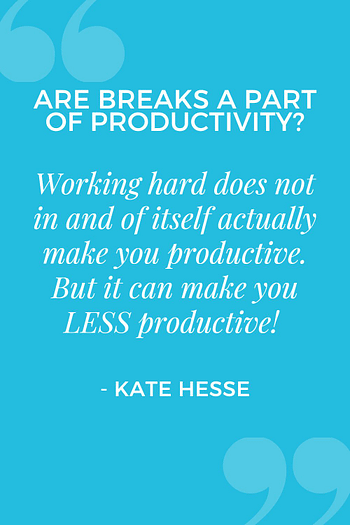 Let’s start by recognizing that working hard does not in and of itself actually make you productive. If I wanted to plant a tree in the back yard, digging a giant hole in the front yard would be working hard, but it wouldn’t bring me any closer to my goal of getting a tree planted in the back yard.
Let’s start by recognizing that working hard does not in and of itself actually make you productive. If I wanted to plant a tree in the back yard, digging a giant hole in the front yard would be working hard, but it wouldn’t bring me any closer to my goal of getting a tree planted in the back yard.
And in fact, that version of working hard would actually leave me so tired I wouldn’t have the energy to actually be productive on digging a hole in the back yard where I needed one.
You might be thinking – of course that isn’t productive Kate – but I wouldn’t dig a hole in the front yard when I needed a hole in the back yard.
But the truth is we do the equivalent of that all the time.
Creating extra work for yourself doesn’t make you productive
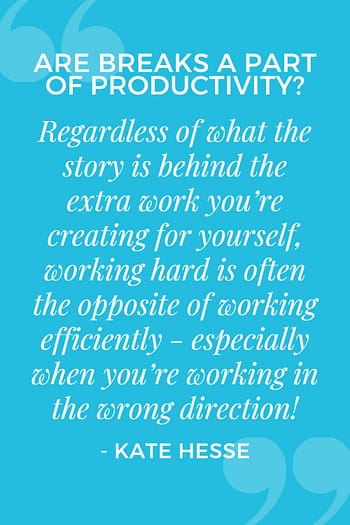 When I was married to my first husband, I used to make a pasta bake almost every week. It was an easy recipe I could toss together with leftover bits and bobs from other meals. And I it was always a little different based on the ingredients I used. But one day my then husband declared he no longer wanted any repeat meals.
When I was married to my first husband, I used to make a pasta bake almost every week. It was an easy recipe I could toss together with leftover bits and bobs from other meals. And I it was always a little different based on the ingredients I used. But one day my then husband declared he no longer wanted any repeat meals.
And that meant pasta bake was out. The easy meal which used up leftover ingredients and prevented waste was abandoned and I spent hours each week finding new recipes, hunting down sometimes obscure ingredients, and cooking something different each day. All while working 40 to 50 hours each week.
The end result – we got fed. Were the unique meals any more nutritious than a pasta bake? Probably not. Did it take more time and energy to get them on the table? Absolutely. Did I have that time and energy to spare? Nope. But did I have poor boundaries and a rampant need to keep the peace which led to me taking on this extra work? Yup. Is there a middle ground I could have proposed? Of course – we could have tried one or two new meals a week and still had a few easy go-to standby meals.
But instead I created a lot of extra work for myself – without being any more productive.
Take a moment and think about where in your life you’re creating extra work. Maybe like my example it’s being driven by people-pleasing and poor boundaries. Maybe you have other stories, fears, and beliefs which fuel your need to create extra work for yourself.
Are you working in the wrong direction?
Regardless of what the story is behind the extra work you’re creating for yourself, working hard is often the opposite of working efficiently especially when you’re working in the wrong direction!
Maybe you’re familiar with the term flow state. This is another way of saying you’re “in the zone”. When you’re working from a place of flow, your attention is easily focused on the task at hand and everything about it seems to come with ease.
Sometimes when I’m writing a podcast or one of my weekly emails, I’ll settle into a flow state. The words just seem to pop out of my fingers as the race across the keyboard. And the content I write when I’m in a state of flow. It’s usually some of my best.
But sometimes I sit down to write and I’m in the opposite of flow. I can’t keep my mind focused on the topic. I use the backspace button more than I do any other key. And the content I create from this place of struggle – it often ends up never seeing the light of day. The copy – and sometimes the entire topic – is abandoned because in reading it I can feel the struggle it took to write it.
What is making this work feel hard?
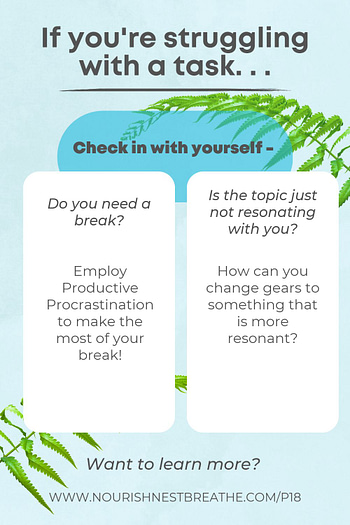 I’ve learned when I’m in that state of struggle to take a few moments and check in with myself. I ask myself two question:
I’ve learned when I’m in that state of struggle to take a few moments and check in with myself. I ask myself two question:
- First – Do I need a break?
- Second – Is this topic just not resonating with me?
Let’s break those questions down:
First – do I need a break. Maybe I slept poorly the night before, or I’m over hungry, or I’ve been sitting at the computer all day and my body is getting stiff.
You might remember me mentioning productive procrastination in a past episode – this would be a great time to employ it. If you find you’re struggling to focus on the task at hand, take a moment and think about what your body and mind might need to reset and refresh.
For example, if you’ve been at a desk all day, it might be walking a document to a colleague or throwing in a load of laundry if you’re working from home. Get all the details on how to get started with productive procrastination.
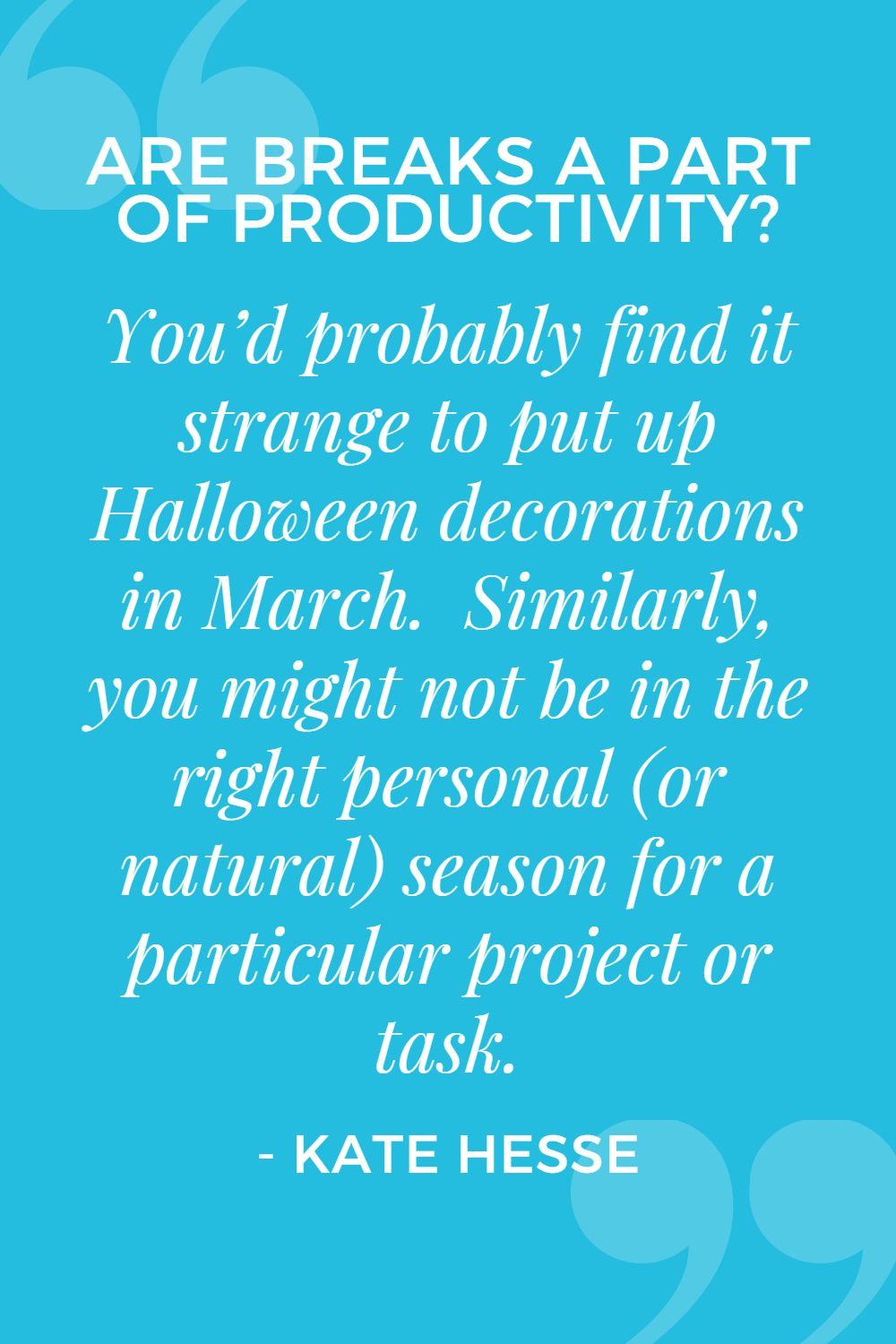 Second – consider if what you’re focused on just isn’t resonating with you.
Second – consider if what you’re focused on just isn’t resonating with you.
Sometimes the topic I’m trying to write about feels forced or awkward – it isn’t something I would normally talk about or it’s not something I feel particularly passionate about or interested in. Or maybe it’s something I’m not feeling confident enough in my own mastery of to offer advice to anyone else.
Maybe you’re engaged in a task or project that just isn’t aligned with your unique priorities and values.
Or perhaps it simply isn’t the right fit right now. For instance – you might find it strange if you tried to put up Halloween decorations in March. Similarly, you might simply not be in the right personal (or natural) season for a particular project or task.
Importance of taking breaks to rest and restore
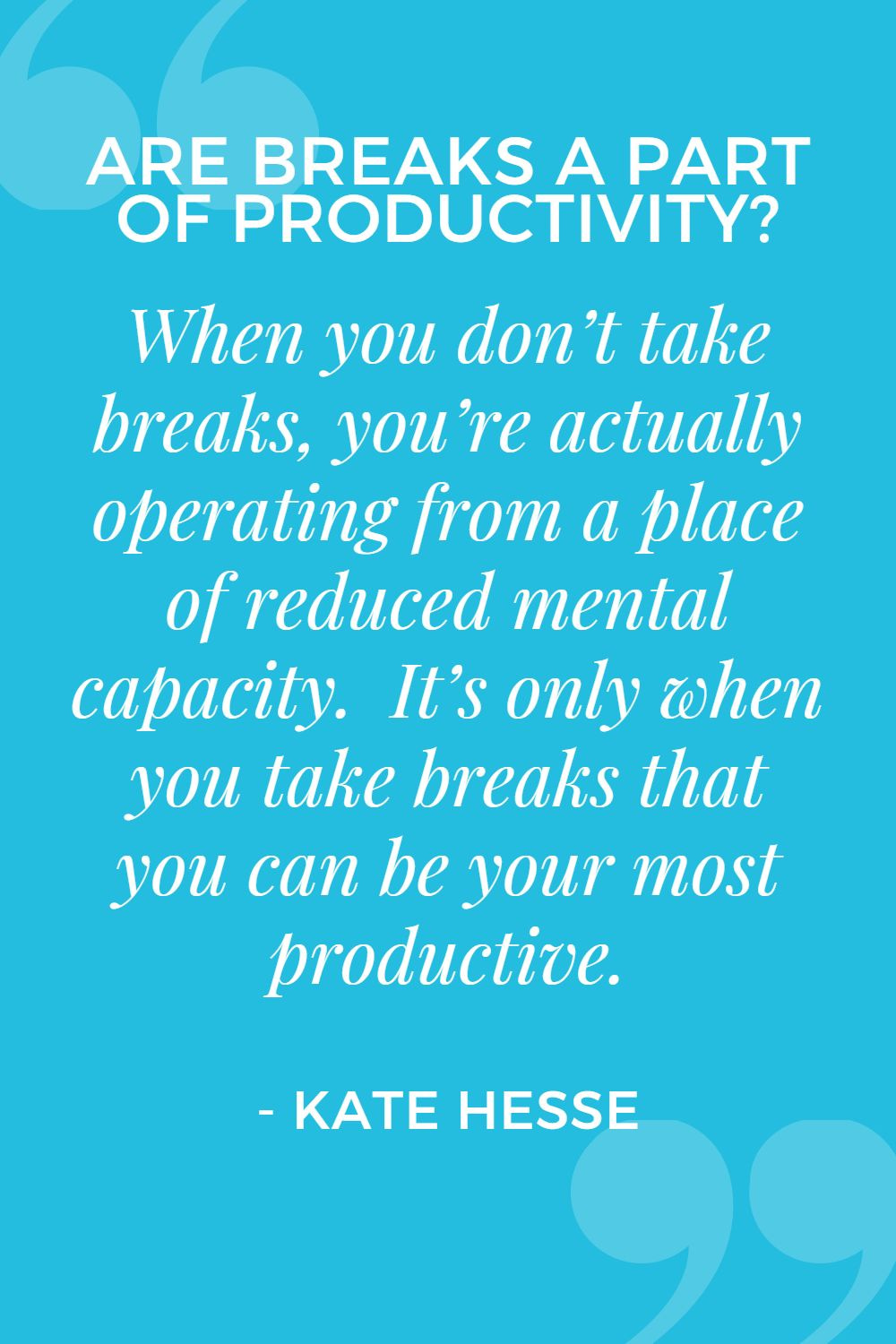 In Episode 8 of the podcast we dove into the stress myth – and debunked the belief that stress makes you more productive.
In Episode 8 of the podcast we dove into the stress myth – and debunked the belief that stress makes you more productive.
Quick recap – when you get stressed the logic and reasoning centers in your brain go off-line. That means anything that requires clear thinking becomes so much harder when you’re stressed.
What that also means is when you take time to rest and shift out of a state of stress those parts of your brain come back on-line and your mental processes are at their most efficient.
In the context of today’s question – when you don’t take breaks, you’re actually operating from a place of reduced mental capacity. It’s only when you take breaks that you can be your most productive.
Creative thinking and problem solving coming from taking breaks
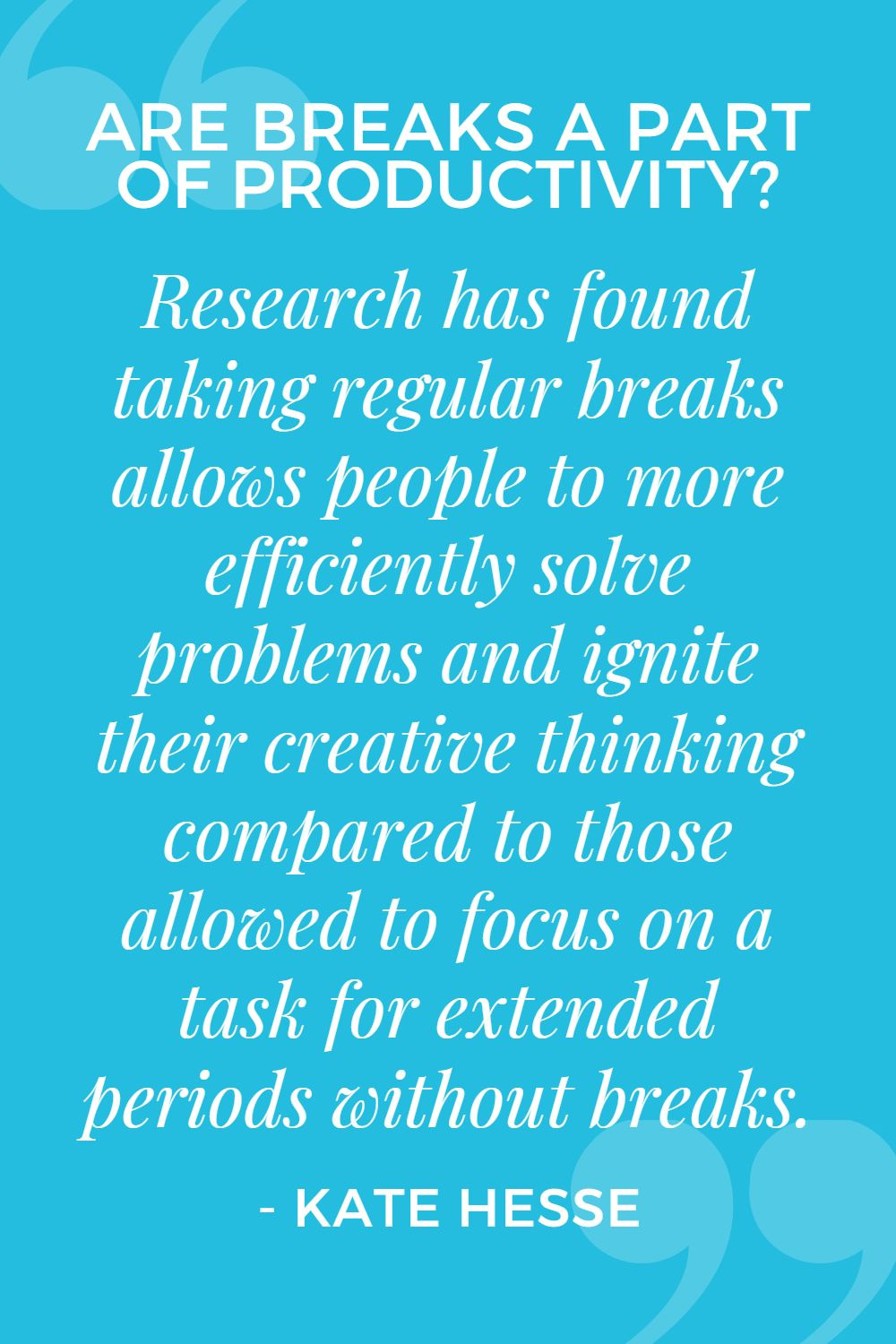 A 2017 study published in the Harvard Business Review found taking breaks was actually key to efficient problem solving and igniting creative thinking. The researchers discovered participants in the study when allowed to focus on a task as long as they wanted ended up circling around dead ends and creating redundant ideas.
A 2017 study published in the Harvard Business Review found taking breaks was actually key to efficient problem solving and igniting creative thinking. The researchers discovered participants in the study when allowed to focus on a task as long as they wanted ended up circling around dead ends and creating redundant ideas.
However, participants who were instructed to take breaks at regular intervals were actually able to solve problems faster and create more novel ideas.
These results are supported by additional research which has also found taking breaks and switching between one project and another allowed participants to be more creative and productive.
One additional interesting note from the study – even when participants felt they were “on a roll” they actually were recreating the wheel over and over again while believing they were making something new.
Intentionally taking breaks – schedule your productive procrastination
If you struggle to give yourself permission to take breaks, consider scheduling your productive procrastination. Set a timer on your computer or phone to remind you to take breaks on a regular basis and pick a task that resonates with you off your productive procrastination list.
Again, if this isn’t a tool currently in your toolkit, you can learn more here.
These regularly scheduled breaks are also a great time to check in with your body and see what it needs. Do you need to stretch your legs? Are you hungry or thirsty? Do you need to use the bathroom?
As someone who used to sit with legs crossed trying to get something finished before rushing to the bathroom, I can guarantee, you’ll be more productive if you take a break to take care of your body’s needs.
Working hard and decision fatigue
In Episode 16 of the podcast we talked about the impact of decision fatigue on your ability to be productive. As we’ve seen, working hard often means spinning your wheels and generating more of the same over and over again.
And with decision making being a depleteable resource, as you approach decision fatigue, each decision you make becomes harder and harder. This is another great example of when we make things more difficult by working harder and not taking breaks to restore.
A great tool to help you reduce the impact of decision fatigue is learning to communicate and work with your intuition. If you’re interested in learning more, check out my Intuition 101 course – podcast listeners save 25% with code PODCAST.
All about burnout
Finally, let’s talk about burnout.
Picture an old fashioned kerosene lamp – the kind with a fuel reservoir and a knob which turns the wick up and down allowing you to control the size of the flame. If you never refill the fuel in the lamp, eventually, the wick will run dry, and no matter how hard you try, you won’t be able to keep the lamp lit.
The same thing happens to us. When we try to work continuously without taking any breaks to refill our reservoir, we become burnt out. And burnout is a slippery slope leading illness, disorder, and disease. And in reference to today’s question – if you’re burnt out, or on your way to it, you simply won’t have the resources you need to actually be productive.
This is yet another way that working hard without taking breaks makes you less productive – not more!
If you’re not sure what burnout looks like or if you might be experiencing it, check out these Seven Signs You’re Suffering from Burnout.
Avoid burnout
You can prevent burnout (or recover from it) by replenishing your mental, physical, and emotional energy reserves faster than you spend them. That means taking breaks to rest and restore.
I know I say this a lot, but because we aren’t cookie cutter humans, what you need to restore is going to be as unique as you are! The way we refill our energy reserves is through self-care, but self-care is so much more than a bubble bath or a massage.
A basic guideline is self-care activities feel like you’ve just received a warm hug from someone you love. But understanding what self-care is and how to make it work for you is a big topic! You can revisit Episode 4 of the podcast to learn more about self-care, or get your copy of my free Self-Care Toolkit and get everything you need to start building a consistent, sufficient, and sustainable self-care routine that works for you and your life. (Get your copy here or using the form below.)
Distraction vs. Self-care
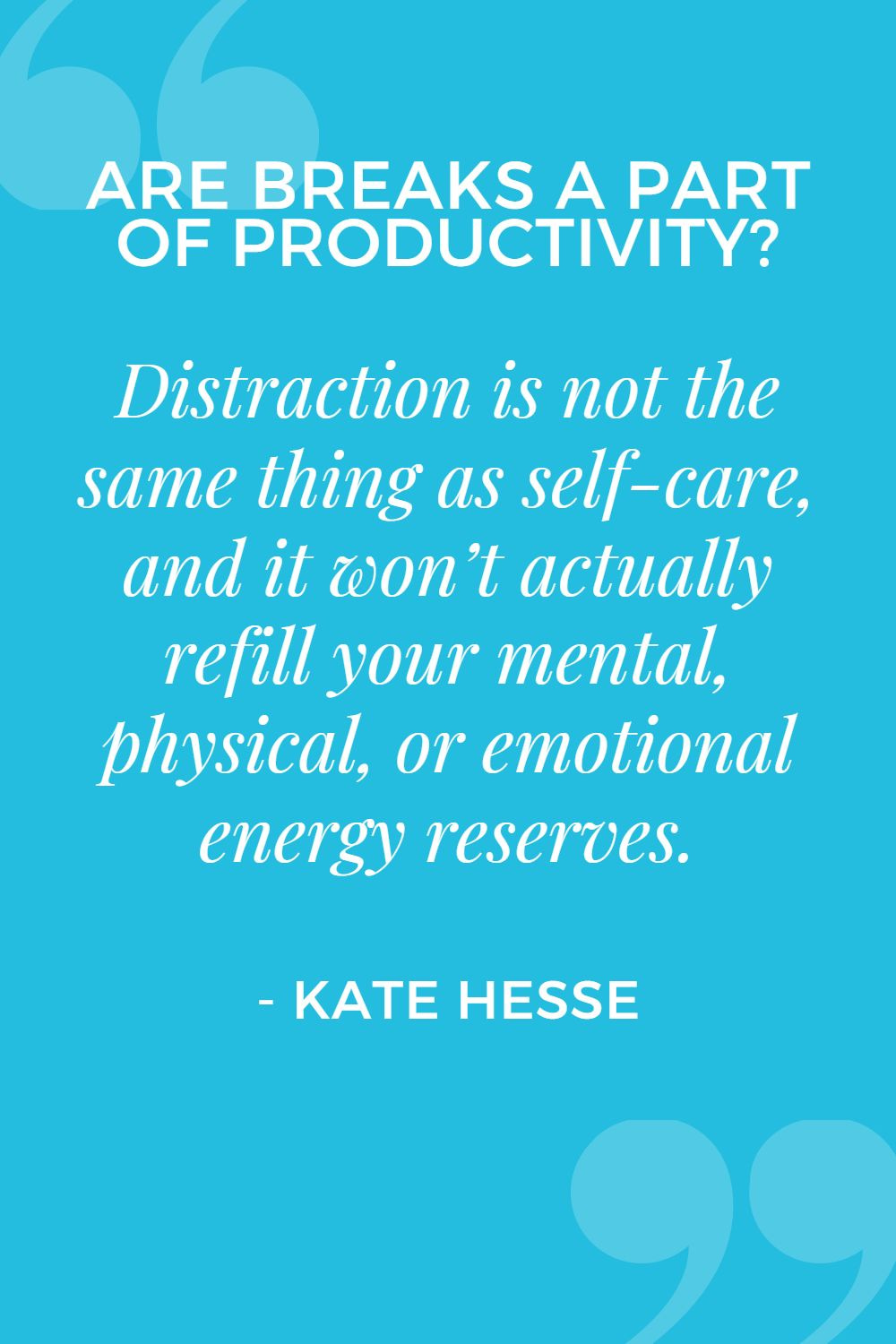 One side note here – distraction is not the same thing as self-care, and it won’t actually refill your mental, physical, or emotional energy reserves. It might slow down the drain of kerosene from your lamp, but it won’t refill it.
One side note here – distraction is not the same thing as self-care, and it won’t actually refill your mental, physical, or emotional energy reserves. It might slow down the drain of kerosene from your lamp, but it won’t refill it.
So the one caveat to everything we’ve covered today, is prioritizing distraction activities over either working hard or self-care activities won’t help you be more productive.
If you find you’re spending a lot of time engaged in things which pull you out of your own life and distract you from thinking about what you’re thinking, feeling, experiencing, or doing, it might be a good time to do a personal energy audit.
Taking breaks is the key to becoming more productive!
So going back to today’s question – taking breaks actually helps you be MORE productive, not less. And working hard without breaks is a great way to be LESS productive.
If you’re ready to make the most of your breaks, check out this post on Productive Procrastination, and grab your copy of the free Self-Care Toolkit.
And remember – living your best life isn’t about changing your life – it’s about changing the way you show up for your life!
Show Notes
Additional Resources
I skimmed the surface of several tools and techniques in this post, so be sure to check out the additional resources linked below for anything which resonated with you! And don’t forget to grab your copy of the free Self-Care Toolkit using the form below!
Mentioned in this Episode
Everything you need to get started with Productive Procrastination
Revisit The Stress Myth
Learn more about Decision Fatigue
Intuition 101 – use code PODCAST to save 25%
7 Signs You’re Suffering from Burnout
Learn more about Where You Might be Going Wrong With Your Self-Care
Get all the details on how to conduct a Personal Energy Audit
Schedule a Discovery Session.
Get on the VIP list to have all podcast worksheets delivered to your inbox each Tuesday morning.
Submit your question to be featured on a future episode.
Related
One thought on “Stop Working Hard and Start Taking Breaks to be Productive”
Leave a Reply Cancel reply
This site uses Akismet to reduce spam. Learn how your comment data is processed.
[…] been listening to Solicited Advice to Live Your Best Life for a while, you might remember back in Episode 18 I talked about breaks being a critical piece of productivity. I cited several studies which […]